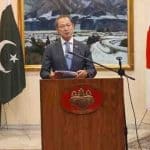LISBON, Jun 04 (APP):Pakistan, speaking on behalf of the “Group of 77” (developing countries) and China, Wednesday called on the developed countries to take the lead in addressing the challenges facing the world’s oceans, seas and marine resources.
“We face global emergency of the Oceans,” Ambassador Munir Akram, permanent representative of Pakistan to the UN, told the UN Ocean Conference being held in Lisbon, Portugal.
“Sea levels are rising, coastal erosion is worsening, marine pollution is increasing, marine biodiversity is rapidly declining, and the Ocean is warmer and more acidic, he told the conference, co-hosted by Portugal and Kenya.
Pakistan is the current chairman of G-77 and China, which now has 134 members
and is the United Nations’ biggest intergovernmental group of emerging countries.
In his remarks, the G-77 chairman said the actions required to address the threat to the Oceans, whose health is in peril because of human activities, have been identified.
“What is needed urgently is to mobilize the means of implementation, such as financing, technology transfer, and capacity building, as well as to enhance scientific knowledge and research especially to assist developing countries in protecting and restoring the Oceans,” Ambassador Akram said.
“We must fully understand and better manage the multiple aspects of oceanic sustainability, ranging from sustainable fisheries, ecosystem health and prevention
of marine pollution” through an institutional framework,” the G-77 chairman said.
In the long term, they said, the adverse effects of climate change on oceans will have profound and unpredictable consequences with huge costs for humanity, and urged the developed countries to fulfill their international commitments by taking accelerated action on mitigation and adaptation in a balanced manner and urgently fulfill their long overdue commitment to provide US$100 billion per annum in climate finance.
“The Group of 77 similarly hopes that all the commitments adopted at this Conference will be immediately implemented by all parties States, corporations, civil society and other stakeholders to save and sustain the Oceans for the benefit of people and planet.”
Speaking in his national capacity, Ambassador Akram told delegates from around the world that Pakistan is planting 7.5 million mangroves in the coastal area to meet with the challenge of acidification and biodiversity degradation,
‘We have also established a marine pollution control board and a ‘Greater Karachi Sewerage Plan’ to halt ocean pollution,”Ambassador Akram said.
Pakistan has also maintained the proportion of marine biodiversity area for three years at 14.6%, and in 2017, declared Astola, an area of 400 sq km, as its marine protected area, Ambassador Akram said.
Pakistan will soon declare the “Indus River Canyon” area of 27,607 sq. km, as another marine protected area, thus achieving the 10% target (14.5).
On Sustainable fishing, Ambassador Akram said that Pakistan has maintained proportion of its fish stock at 30% within biologically sustainable level for five years.
“We have completely banned illegal fishing practices”, he said.
“It is essential that our efforts are complemented by international cooperation, particularly by one of our neighbours, by completely banning IUU (Illegal, unreported, and unregulated) fishing,” Ambassador Akram said.
Pakistan, he said, has also launched “Green Ship Breaking” project to adopt sustainable practices in the ship breaking industry.
Follow the PNI Facebook page for the latest news and updates.









